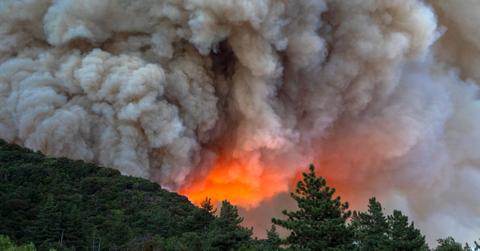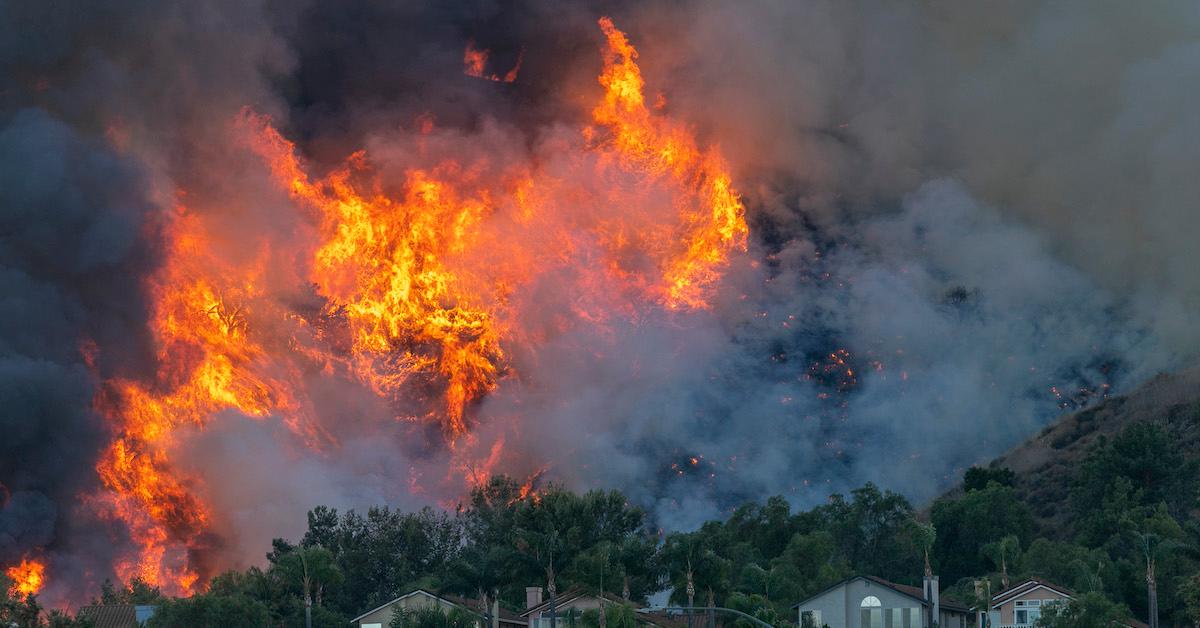How Wildfire Smoke Caused 19,700 Additional COVID Cases, According to New Harvard Study
Published Aug. 18 2021, 12:00 p.m. ET

Flames and heavy smoke approach on a western front of the Apple Fire, consuming brush and forest at a high rate of speed during an excessive heat warning on Aug. 1, 2020 in Cherry Valley, Calif.
Since the moment we all experienced COVID-19 lockdowns, environmentalists have been saying we need to start treating the climate crisis with the same urgency as the coronavirus — and new data on the connection between the two crises only highlights that need even more. According to new research, wildfire smoke is linked to COVID cases and even deaths in several states.
And with several U.S. states experiencing rough wildfire seasons alongside the pandemic, it’s clearer than ever that if we want to protect humans, we need to take stronger action to end the climate crisis as well as the pandemic.

Flames rise near homes during the Blue Ridge Fire on Oct. 27, 2020 in Chino Hills, Calif.
Wildfire smoke is linked to COVID cases and deaths.
This month, the Harvard T.H. Chan School of Public Health published research in the journal Science Advances connecting wildfires and the coronavirus. They found that between March (when COVID first hit the U.S.) and December of 2020, significant wildfires in three states — California, Oregon, and Washington — may have caused 19,700 COVID cases and 750 deaths.
To come to these conclusions, the researchers created a statistical model to analyze data on PM2.5 (fine particulate air pollution) concentrations, wildfire data, COVID-19 case data, and COVID death data across 92 counties from California, Oregon, and Washington (covering about 95 percent of the three states’ populations).
“Climate change will likely bring warmer and drier conditions to the West, providing more fuel for fires to consume and further enhancing fire activity,” Harvard professor and study author Francesca Dominici said in a statement. “This study provides policymakers with key information regarding how the effects of one global crisis — climate change — can have cascading effects on concurrent global crises — in this case, the COVID-19 pandemic.”
How can PM2.5 exposure and air pollution cause COVID?
Specifically, wildfire smoke emits PM2.5 pollution into the atmosphere; at some points during severe 2020 wildfires, the EPA classified PM2.5 levels “hazardous.”
Breathing in PM2.5 can cause short-term health effects such as irritation of the eyes, nose, lungs, and throat, coughing, runny nose, shortness of breath, and sneezing; in the long-term, PM2.5 exposure can cause or worsen asthma, heart disease, lung issues, chronic bronchitis, and death from lung cancer and heart disease, according to the New York State Department of Health.
According to the new study, the wildfires “amplified the effect of exposure to PM2.5 on COVID-19 cases and deaths.” But how exactly can PM2.5 exposure cause someone to contract COVID?
A November 2020 paper published in PubMed Central reported that according to the World Health Organization (WHO), people who live in areas with high PM2.5 levels (even before the coronavirus pandemic) are “more vulnerable to the infection” than people who live in areas with less air pollution.
Basically, because PM2.5 exposure causes preexisting conditions like lung cancer, respiratory disorders, and cardiovascular disorders, it makes people experiencing issues associated with PM2.5 more susceptible to the virus. And if that person comes into contact with the virus, it’s a perfect cocktail for contracting it. Fortunately, COVID-19 vaccines are doing a lot to reduce the spread and severity of COVID-19 cases — but as of now, there’s no vaccine for the climate crisis.